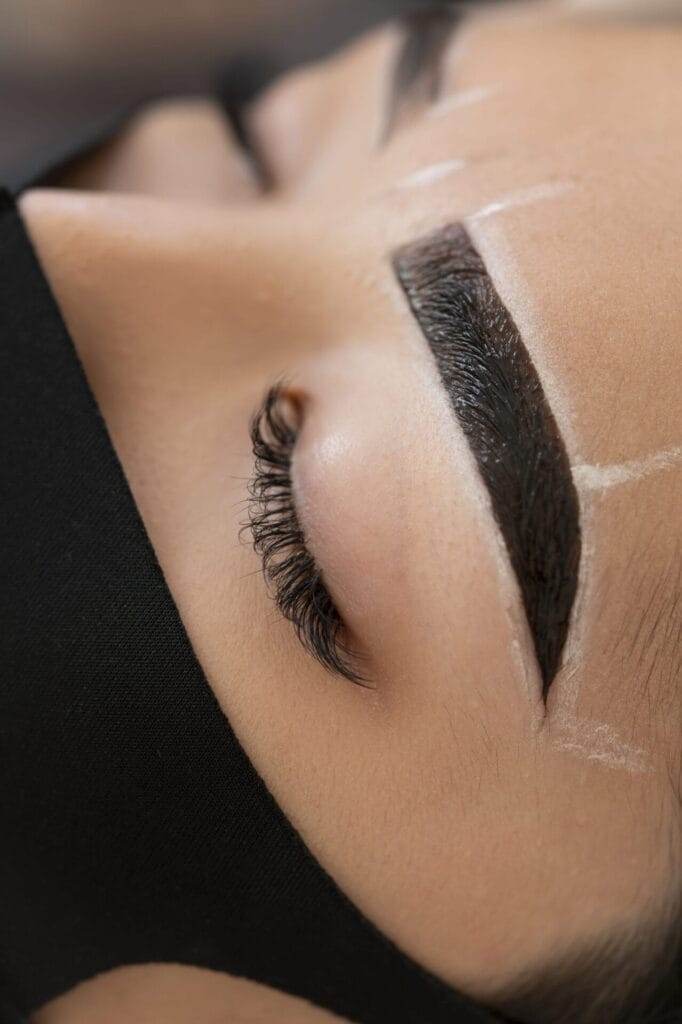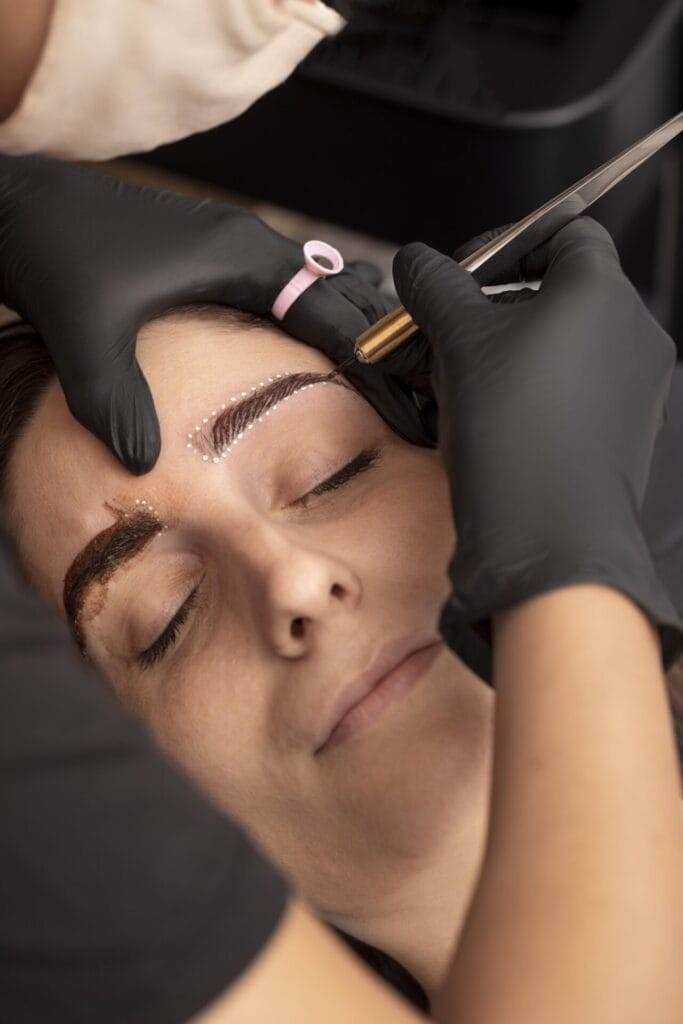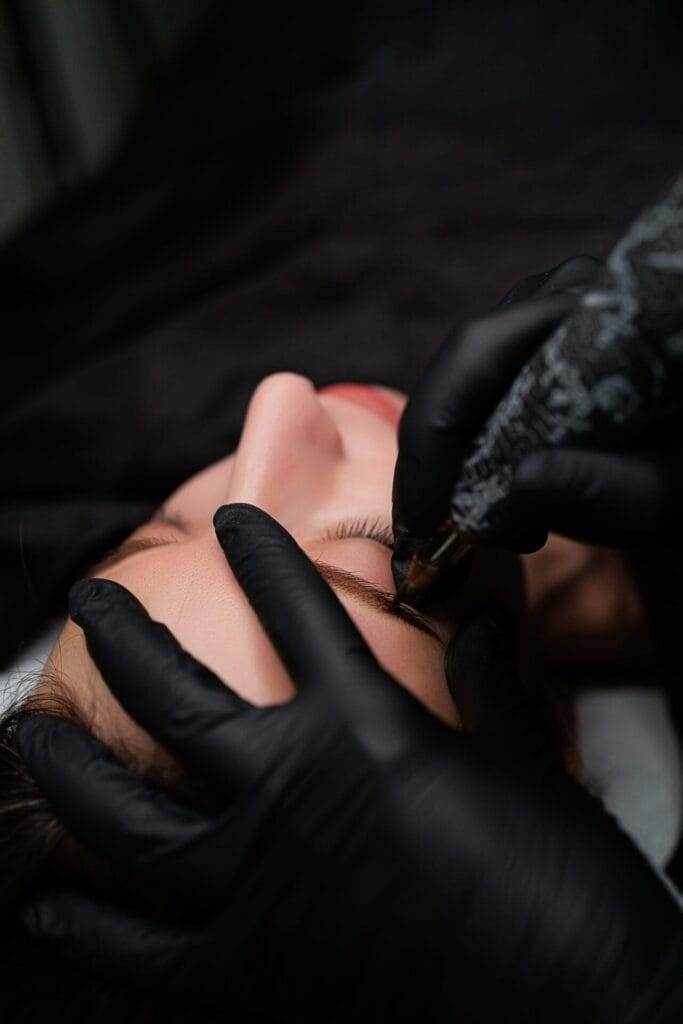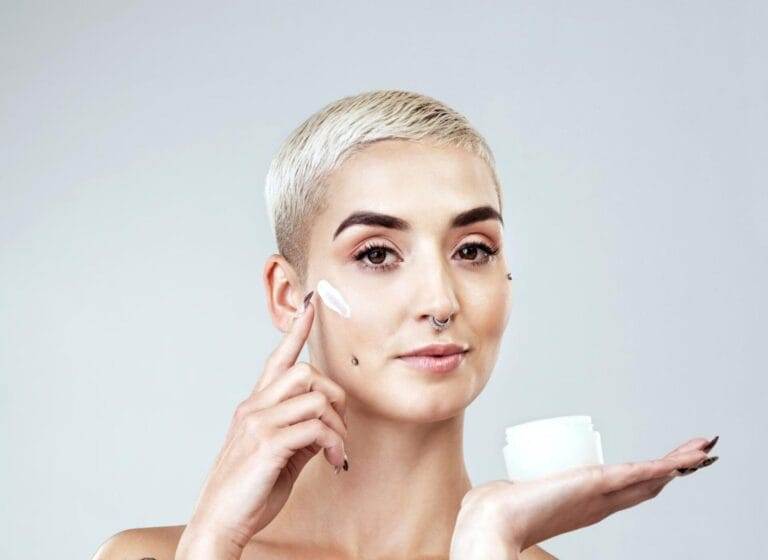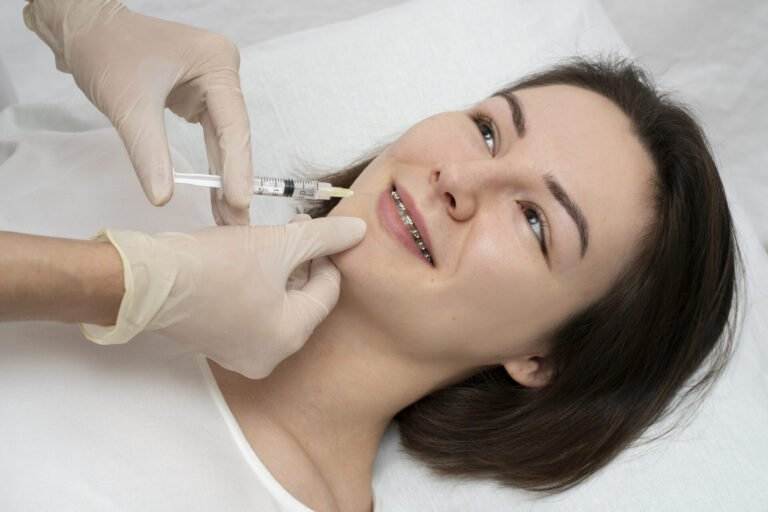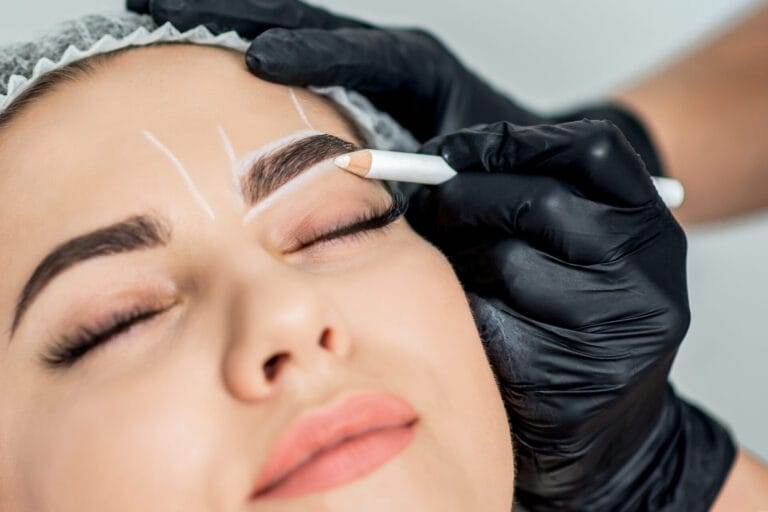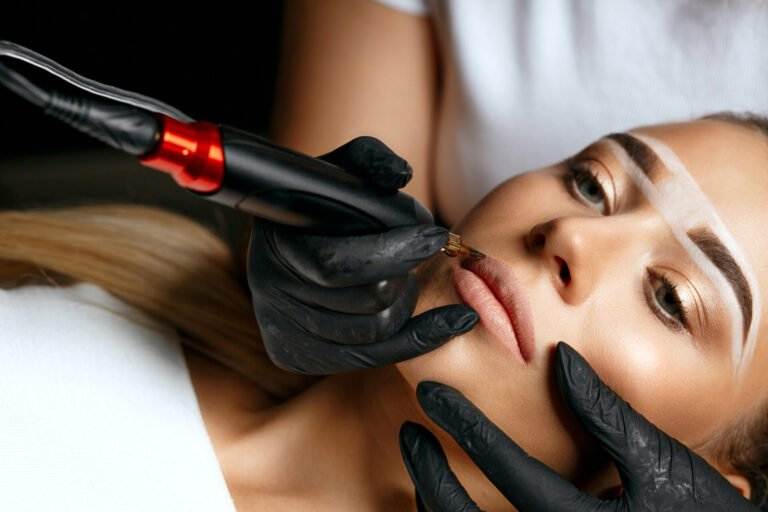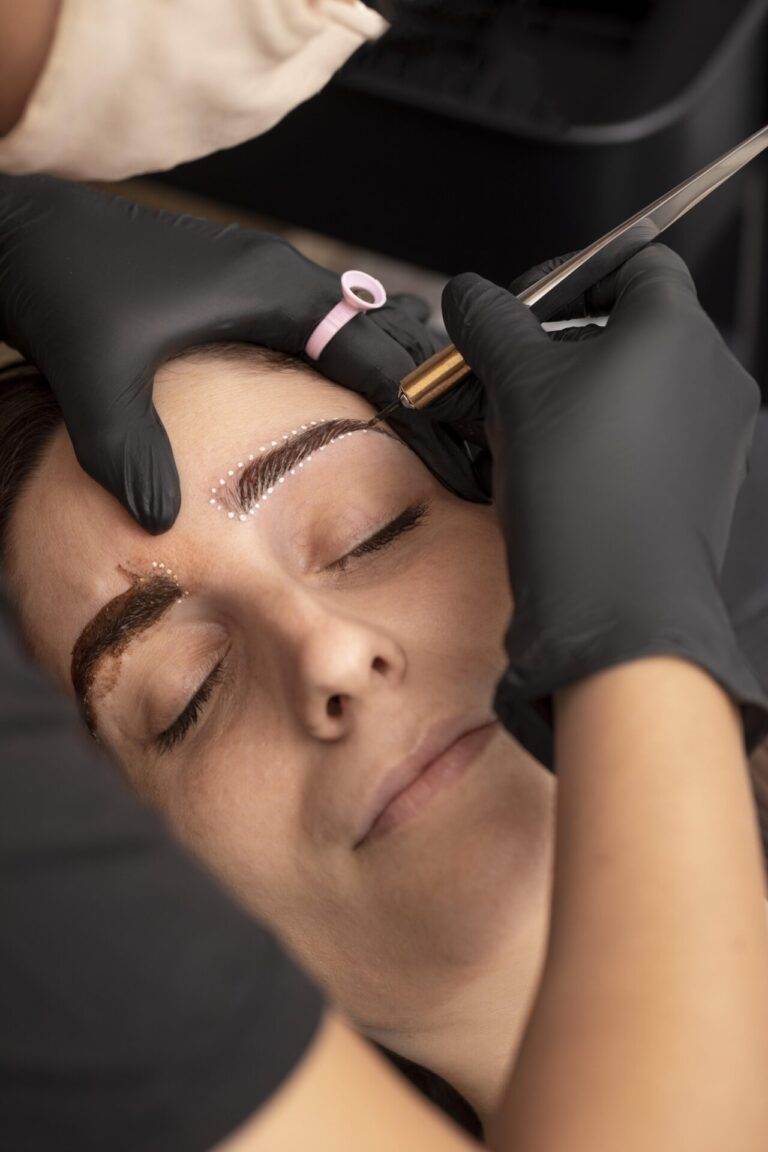Cosmetic tattoos, also known as permanent makeup or micropigmentation, are a form of tattooing that involves applying pigment to the skin to enhance features such as eyebrows, eyeliner, and lips. Unlike traditional tattoos, cosmetic tattoos are designed to mimic the appearance of makeup and provide a long-lasting solution for those who want to save time and effort in their daily beauty routine.
There are several types of cosmetic tattoos available, including eyebrow tattoos, eyeliner tattoos, lip tattoos, and even areola tattoos for breast reconstruction patients. Each type of cosmetic tattoo serves a different purpose and can be customized to suit individual preferences. For example, eyebrow tattoos can help fill in sparse or thin eyebrows, while lip tattoos can add color and definition to the lips.
One of the main benefits of cosmetic tattoos is their longevity. Unlike traditional makeup that needs to be applied and reapplied throughout the day, cosmetic tattoos can last for several years with proper maintenance. This makes them a convenient option for those who want to wake up with perfectly shaped eyebrows or defined eyes without the hassle of daily makeup application.
Understanding the Importance of Maintaining Cosmetic Tattoos
While cosmetic tattoos are designed to be long-lasting, it is important to understand that they still require regular maintenance to ensure their longevity. Neglecting proper maintenance can lead to fading, uneven color, and even infections or complications.
Maintenance is important because cosmetic tattoos are not permanent and will naturally fade over time. The pigments used in cosmetic tattoos are designed to break down slowly over the years, which is why touch-ups are often necessary to maintain the desired look. By properly maintaining your cosmetic tattoos, you can extend their lifespan and keep them looking fresh and vibrant.
Neglecting maintenance can have serious consequences for your cosmetic tattoos. Without regular touch-ups and proper care, the pigments can fade unevenly, resulting in a patchy or unnatural appearance. In addition, neglecting aftercare instructions can increase the risk of infections and complications, which can be painful and require medical intervention.
With proper maintenance, cosmetic tattoos can last for several years. The exact longevity will depend on various factors, such as the type of tattoo, the quality of the pigments used, and individual skin characteristics. However, by following the recommended aftercare instructions and scheduling regular touch-ups, you can enjoy your cosmetic tattoos for an extended period of time.
Tips for Proper Aftercare of Cosmetic Tattoos
Proper aftercare is crucial for maintaining the appearance and longevity of your cosmetic tattoos. It is important to follow the aftercare instructions provided by your tattoo artist to ensure optimal healing and minimize the risk of complications.
One of the most important aspects of aftercare is keeping the tattooed area clean and free from bacteria. This involves gently washing the area with a mild, fragrance-free cleanser and lukewarm water. Avoid using harsh soaps or scrubbing the area vigorously, as this can irritate the skin and disrupt the healing process.
In addition to cleaning, it is important to avoid certain activities and products during the healing process. This includes avoiding swimming pools, saunas, and excessive sweating, as well as refraining from applying makeup or other skincare products directly on the tattooed area. These activities can introduce bacteria or irritants to the healing skin, leading to infections or complications.
To avoid infections and complications, it is important to keep the tattooed area moisturized. Apply a thin layer of a recommended moisturizer or ointment to keep the skin hydrated and prevent dryness or cracking. Be sure to use products specifically formulated for cosmetic tattoos, as regular moisturizers may contain ingredients that can interfere with the healing process.
How to Clean and Moisturize Your Cosmetic Tattoos
Cleaning and moisturizing your cosmetic tattoos properly is essential for maintaining their appearance and preventing complications. It is important to use the right products and techniques to ensure optimal healing and longevity.
When it comes to cleaning your cosmetic tattoos, it is recommended to use a gentle, fragrance-free cleanser that is specifically formulated for tattoo aftercare. Avoid using harsh soaps or cleansers that contain alcohol or other irritants, as these can disrupt the healing process and cause irritation. Gently wash the tattooed area with lukewarm water and a small amount of cleanser, using your fingertips or a soft cloth. Pat the area dry with a clean towel, avoiding rubbing or scrubbing.
After cleaning, it is important to moisturize the tattooed area to keep the skin hydrated and prevent dryness or cracking. Use a recommended moisturizer or ointment that is specifically formulated for cosmetic tattoos. Apply a thin layer of the product to the tattooed area, using clean hands or a cotton swab. Avoid applying too much product, as this can clog the pores and interfere with the healing process.
The frequency of cleaning and moisturizing will depend on the stage of healing and the recommendations provided by your tattoo artist. In general, it is recommended to clean the tattooed area twice a day and moisturize as needed to keep the skin hydrated. However, be sure to follow the specific aftercare instructions provided by your tattoo artist, as they may vary depending on the type of tattoo and individual healing characteristics.
Avoiding Sun Exposure and Other External Factors
Sun exposure can have a significant impact on the appearance and longevity of cosmetic tattoos. UV rays can cause the pigments to fade or change color, resulting in a less vibrant or distorted appearance. It is important to protect your cosmetic tattoos from sun exposure to ensure their longevity.
To avoid sun damage, it is recommended to apply a broad-spectrum sunscreen with a high SPF to the tattooed area whenever you are exposed to sunlight. Look for a sunscreen that is specifically formulated for tattoo protection, as regular sunscreens may not provide adequate protection for the pigments. Reapply the sunscreen every two hours or as directed on the product label.
In addition to sun exposure, there are other external factors that can affect the appearance and longevity of cosmetic tattoos. These include chlorine from swimming pools, saltwater from the ocean, and harsh chemicals from skincare or beauty products. It is important to avoid exposing your cosmetic tattoos to these external factors to prevent fading or complications.
To protect your cosmetic tattoos from external factors, it is recommended to avoid swimming pools, saunas, and hot tubs during the healing process. If you do need to swim, apply a waterproof barrier cream or ointment to the tattooed area to create a protective barrier. Avoid using skincare or beauty products directly on the tattooed area, as these can contain ingredients that can interfere with the pigments or irritate the skin.
Choosing the Right Products for Your Cosmetic Tattoos

Choosing the right products for your cosmetic tattoos is essential for maintaining their appearance and preventing complications. There are several factors to consider when selecting products, including the type of tattoo, individual skin characteristics, and personal preferences.
When choosing cleaning and moisturizing products for your cosmetic tattoos, it is important to look for products that are specifically formulated for tattoo aftercare. These products are designed to be gentle on the skin and contain ingredients that promote healing and hydration. Avoid using regular soaps, cleansers, or moisturizers that may contain harsh ingredients or fragrances that can irritate the skin.
Different types of cosmetic tattoos may require different products. For example, eyebrow tattoos may benefit from a clear brow gel or wax to keep the hairs in place and maintain their shape. Lip tattoos may benefit from a lip balm or gloss with SPF to protect the pigments from sun damage. Consult with your tattoo artist or a skincare professional to determine the best products for your specific type of cosmetic tattoo.
Before using any new products on your cosmetic tattoos, it is important to test them on a small, inconspicuous area of skin to check for any adverse reactions. Apply a small amount of the product to the tattooed area and wait 24 hours to see if any redness, itching, or irritation occurs. If there are no adverse reactions, you can safely use the product on your cosmetic tattoos.
Understanding the Healing Process of Cosmetic Tattoos
The healing process of cosmetic tattoos can be divided into several stages, each requiring specific care and attention. Understanding the stages of healing and how to care for your cosmetic tattoos during each stage is essential for maintaining their appearance and preventing complications.
The first stage of healing is the initial healing stage, which lasts for about one to two weeks. During this stage, the tattooed area may be red, swollen, and tender. It is important to keep the area clean and moisturized during this stage to promote healing and prevent infections. Avoid picking or scratching at the scabs that may form, as this can disrupt the healing process and lead to scarring.
The second stage of healing is the peeling or flaking stage, which typically occurs around two to four weeks after the tattooing procedure. The tattooed area may start to peel or flake as the top layer of skin sheds. It is important to avoid picking or pulling at the peeling skin, as this can cause uneven color or scarring. Continue to keep the area clean and moisturized during this stage to promote healing.
The final stage of healing is the settling or maturing stage, which can last for several months. During this stage, the tattooed area may continue to fade slightly and settle into its final color and appearance. It is important to continue following proper aftercare instructions during this stage to ensure optimal healing and maintain the desired look of your cosmetic tattoos.
During the healing process, it is important to be aware of any signs of complications. These can include excessive redness, swelling, pain, or discharge from the tattooed area. If you experience any of these symptoms, it is important to seek medical attention as soon as possible, as they may indicate an infection or other complications that require treatment.
How to Deal with Fading and Touch-Ups
Fading is a natural part of the aging process for cosmetic tattoos. Over time, the pigments will break down and fade, resulting in a less vibrant or defined appearance. However, there are steps you can take to prevent fading and maintain the desired look of your cosmetic tattoos.
One of the main causes of fading is sun exposure. UV rays can cause the pigments to break down and change color, resulting in a less vibrant or distorted appearance. To prevent fading, it is important to protect your cosmetic tattoos from sun exposure by applying a broad-spectrum sunscreen with a high SPF whenever you are exposed to sunlight.
Another factor that can contribute to fading is the use of skincare or beauty products that contain harsh ingredients or exfoliants. These products can accelerate the breakdown of the pigments and cause them to fade more quickly. It is important to avoid using these products directly on the tattooed area and opt for gentle, fragrance-free alternatives instead.
Regular touch-ups are also necessary to maintain the desired look of your cosmetic tattoos. Touch-ups involve adding more pigment to areas that have faded or become less defined over time. The frequency of touch-ups will depend on various factors, such as the type of tattoo and individual skin characteristics. It is recommended to consult with your tattoo artist to determine the appropriate timing for touch-ups.
Common Mistakes to Avoid When Maintaining Cosmetic Tattoos
There are several common mistakes that people make when maintaining their cosmetic tattoos. These mistakes can lead to fading, uneven color, infections, or other complications. By avoiding these mistakes, you can ensure the longevity and optimal appearance of your cosmetic tattoos.
One common mistake is neglecting aftercare instructions. Proper aftercare is crucial for the healing process and maintaining the appearance of your cosmetic tattoos. It is important to follow the aftercare instructions provided by your tattoo artist and avoid activities or products that can interfere with the healing process.
Another common mistake is using harsh or abrasive products on the tattooed area. Regular soaps, cleansers, or exfoliants can irritate the skin and disrupt the healing process. It is important to use products that are specifically formulated for tattoo aftercare and avoid using any products that contain harsh ingredients or fragrances.
Picking or scratching at the tattooed area is another common mistake that can lead to complications. This can cause scarring, uneven color, or infections. It is important to resist the urge to pick or scratch at the tattooed area and allow it to heal naturally.
Seeking Professional Help for Cosmetic Tattoo Maintenance
While proper at-home maintenance is essential for maintaining the appearance of your cosmetic tattoos, there may be times when professional help is needed. Seeking professional help can ensure that any issues or concerns are addressed promptly and effectively.
If you experience any complications or adverse reactions during the healing process, it is important to seek medical attention as soon as possible. A healthcare professional can assess the situation and provide appropriate treatment to prevent further complications.
Regular touch-ups are also best performed by a professional tattoo artist. They have the knowledge and expertise to add more pigment and maintain the desired look of your cosmetic tattoos. It is recommended to schedule touch-ups with your tattoo artist according to their recommendations to ensure optimal results.
When seeking professional help for cosmetic tattoo maintenance, it is important to choose a reputable and experienced professional. Look for a tattoo artist who specializes in cosmetic tattoos and has a portfolio of their work. Read reviews and ask for recommendations from trusted sources to ensure that you are choosing a professional who can provide high-quality services.

Final Thoughts on Maintaining Your Cosmetic Tattoos Like a Pro
Maintaining your cosmetic tattoos like a pro requires proper care, attention, and regular touch-ups. By following the recommended aftercare instructions, avoiding sun exposure and other external factors, choosing the right products, and seeking professional help when needed, you can enjoy your cosmetic tattoos for years to come.
Remember that cosmetic tattoos are not permanent and will naturally fade over time. Regular touch-ups are necessary to maintain the desired look and prevent fading or uneven color. By taking the time to properly care for your cosmetic tattoos, you can ensure their longevity and keep them looking fresh and vibrant.
In conclusion, cosmetic tattoos offer a convenient and long-lasting solution for those who want to enhance their features without the hassle of daily makeup application. By understanding the importance of maintaining cosmetic tattoos, following proper aftercare instructions, choosing the right products, and seeking professional help when needed, you can enjoy the benefits of cosmetic tattoos for an extended period of time. Take the time to care for your cosmetic tattoos like a pro and enjoy the confidence and convenience they provide.

